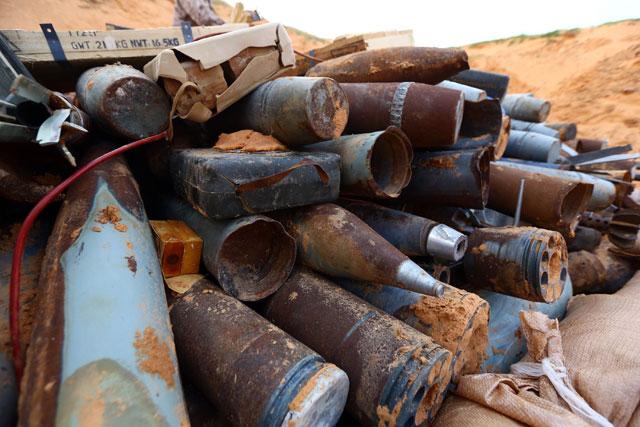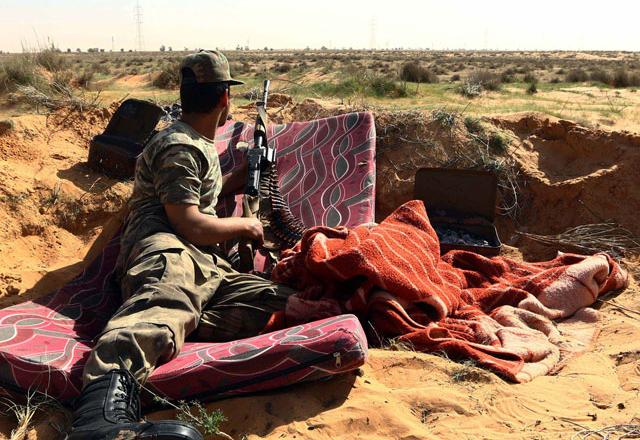You are here
Libya reopens strike-hit oil port as UN convenes peace talks
By Reuters - Feb 10,2015 - Last updated at Feb 10,2015

TRIPOLI — Libya reopened its oil port of Hariga on Tuesday, ending a strike by guards that had threatened to further slash exports as rival factions fight for control of the OPEC country.
The threat to shut down Hariga underlined the fragility of oil shipments as two competing governments and their armed allies are locked in a scramble for territory and petroleum wealth.
Hariga reopened shortly before the United Nations was expected to hold talks to prevent a wider conflict that Western governments fear will turn Libya into a failed state just across the Mediterranean from Europe.
Libya shut most operations at the Hariga terminal near Egypt's border, the last functioning land oil export terminal, on Saturday after security guards prevented a tanker from docking in a protest over wage payments.
"An oil tanker was supposed to dock at the port this morning, but the weather was against this. We will wait until the weather allows us to go ahead," said Omran Al Zwie, a spokesman for the company operating Hariga.
The North African country's two largest oil ports, Es Sider and Ras Lanuf, with a combined capacity of around 600,000 barrels per day, have been closed by fighting between the two loose confederations of armed factions since December.
Nearly four years after civil war toppled veteran leader Muammar Qadhafi, Libya is caught in struggle between an internationally recognised government and a rival administration set up in Tripoli after an armed faction known as Libya Dawn took over the capital in the summer.
Each faction claims legitimacy and is backed by brigades of former rebels who once fought Qadhafi, but steadily turned on one another in internecine warfare.
Underlining the scale of the crisis, the International Energy Agency said on Tuesday Libya's oil production fell by 100,000 bpd in January to 340,000 bpd. Before the 2011 civil war, it produced around 1.6 million bpd.
The United Nations last month began a new round of talks in Geneva, which brought some of the warring factions together to discuss a unity government and a ceasefire.
'Great, great danger'
Representatives from both sides said those talks would restart in the Libyan town of Ghadames on Wednesday with delegates from the elected House of Representatives and from the rival General National Congress (GNC), the former parliament reinstated by Tripoli's new rulers.
The UN special envoy to Libya, Bernardino Leon, said the most influential political and military groups now supported the process, which in the first stage would include a unity government, a ceasefire and armed groups leaving cities and strategic facilities.
"We have agreed on an agenda," he told UN radio. "We still have a long way even if we're successful in the first stage."
Maintaining a ceasefire or holding a political agreement together is a complex task because the two factions are loose coalitions of different armed groups and political leaders whose loyalties are not always aligned.
There are also questions about whether delegates attending the talks will be able to bring on board the hardliners among the armed groups on the ground, who still believe they can gain more from fighting.
Official Prime Minister Abdullah Al Thinni and the elected parliament are based in the east. They are loosely allied with the town of Zintan and with former Qadhafi army General Khalifa Haftar, who started his own campaign against Islamist militants in Benghazi
The Tripoli government is formed from former members of the GNC, some Islamist-leaning former rebel brigades, and former armed battalions from the city of Misrata, one of the most powerful regions.
But the slump in world oil prices, the cutoff in Libya's own production and the fallout from the conflict are taking their toll and adding to economic pressures for a quick solution. A budget crisis is already starting to hit vital imports, like wheat.
Libya will exhaust its wheat reserves in two or three months unless a state fund tasked with ensuring supplies receives money held up as a result of the turmoil gripping the country and a slump in oil revenues, a top official said.
"The country is in great, great danger," UN Human Rights spokesman Rupert Colville said in Geneva. "Dialogue is vital and we really hope it finds a way quickly through this morass to some sort of sanity in Libya."
Related Articles
A strike by security guards has closed Libya's eastern oil port of Hariga, the country's last functioning export port apart from two offshore fields, a port official said on Sunday.
Libya's oil sector took another big step back to normality with the restarting of an oil field that could double its current meagre crude output, a week after blockades ended at major ports.
Libya’s acting Prime Minister Abdullah Al Thinni said the government had reached a deal with a rebel leader controlling oil ports to hand over the last two terminals and end a blockade that crippled the nation’s petroleum industry.
















